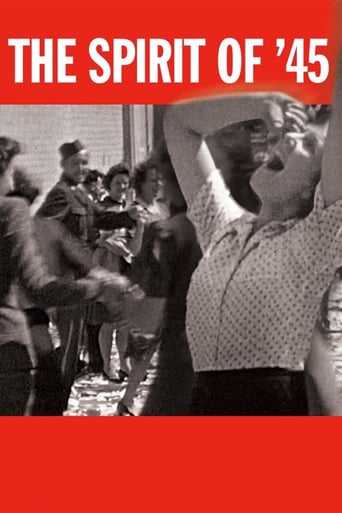antoniotierno
"The Spirit of '45" reminds us of the air of progress occurring in British politics immediately after World War II. It takes back to the founding of welfare state and the nationalization of the health service, transport, energy and other areas of public life. The faces we see at the beginning of the film of young Britons celebrating in the fountains at Trafalgar Square symbolize the hope of a nation. But Loach is also worried about the spirit of modern Britain. The second part ponders a different mood than the one of the 1940s: Thatcherism and the more recent failures of organized labor to live up to its founding principles. On the whole this is a tender and humane film, a compelling mix of interviews, with archive footage. The film works all at once as a lament, a celebration and a wake- up call to modern politicians, it's only a bit boring.
csrothwec
An excellent film in terms of explaining both what the title says, "The Spirit of 1945" leading to the massive victory of the Labour Party in the UK general election of that year and also the roots of that victory. Loach (correctly) goes back to the end of the First World War and how the promises of "A Land fit for Heroes" was betrayed and millions of working men and their families instead spent most of the inter-war years (not just the so-called "Hungry Thirties") living in poverty and destitution. Their children were determined to build a better Britain and, as Loach shows, this feeling was also shared by many people from much wealthier backgrounds as well (in which bodies during the war such as the Army Bureau of Contemporary Affairs also played a significant role). Loach does not shy away from showing the weaknesses of the Labour Government's policies (e.g. very much "top down" and with no trace of the kind of Mitbestimmung which helped to rebuild West German industry in the same period), but he nevertheless paints far too positive a picture of what Attlee's governments actually achieved.By going straight from this period (1945-51) to the arrival of "the Wicked Witch" (Thatcher) in Downing Street in 1979, he is able to skate right over how much the Labour Government had NOT accomplished and just how rotten much of British industry and society was by the early-/mid-1970s (and which provided the environment in which Thatcher could only have come to power.) The short-sightedness of union leaders, for example, in focusing purely and simply on short-term economic gain for their members and rejecting totally Castle's "In Place of Strife" proposlas plus "holding the public to ransom" on unlimited occasions in the 1960s and 1970s is simply ignored as not fitting in with the polemic.In conclusion, watch this film to explain why the Labour election landslide happened, but if you want to know "what happened next", watch the 1959 comedy "I'm all right,Jack" as well. For every stalwart nurse and miner shown in Loach's film, there were unfortunately far too many "Fred Kites" leading their unions in the years after Attlee left office as well!
BJJManchester
Ken Loach's THE SPIRIT OF '45 is one of his occasional forays into documentary,and a timely and prescient one,recalling the immediate period just after World War II had ended,with Britain for the very first time electing a majority government for the Labour Party,led by Clement Attlee,on a genuinely radical,socialist agenda,embracing nationalisation of most heavy industry,a welfare state,Keynesian economics,widespread council house building and perhaps most notably,the founding of the NHS.The British people appreciated Winston Churchill's efforts at leading the nation and defeating the Nazis during the war,but felt Attlee was the man to lead them during the early years of peace afterwards.Loach has never been afraid to acknowledge his socialist leanings in public and on film,and this is a predictably affectionate,sometime sentimental tribute to the system he holds most dear,with interviews with various people from the era,housewives,miners,steelworkers,nurses among them and their experiences of pre-war poverty (some of them very moving),with more up to date opinions from dockers,academics and politicians.It is all relentlessly subjective,with no critical voices from other viewpoints in sight,and there are parts of the film which would've been helped by a more balanced outlook (it fails to acknowledge that the Conservatives broadly accepted these changes when they were in government in the next three decades),as Loach plunges the film into near,but not quite,hysterical tub-thumping,with any other political,social and economic opinions ignored or regarded as virtual evil.This is more than evident in the latter stages of the film;Loach shoots forward in time three full decades to when Margaret Thatcher became Conservative PM in 1979,as important an election as that of 1945.After the various crises of the 70's,such as the oil shock,stagflation and industrial unrest,her dismantling of the post-war consensus,returning to pre-war free market economics,accepted by the Labour Party when they got into power,is predictably savaged,referring to the mid-80's miner's strike,deregulated banks and markets,sale of council houses and industries and utilities privatised across the board.But now with the UK and much of the developed world in the worst recession since the war,mostly caused by the emphasis on free market economics and deregulated banks,perhaps a politically angry film like this should be seen,even if you don't necessarily agree with Loach's politics.Whatever you think of him,for or against,Loach is still a great filmmaker,and though some of the partisan views on show do sometimes become too excessive,it's good to see working class people,old,middle- aged and young,treated with more respect,dignity and compassion than has been the norm for around a decade or so on British film,TV and media in general,when crude if not offensive stereotyping and caricatures have mostly been the order of the day.THE SPIRIT OF '45 is the kind of film that will take no prisoners,and if you are the total opposite in politics to Ken Loach,fire will be spat at the screen.But there is never a dull moment,and Loach's appeal for a more inclusive,equal and less divisive society,all but evident here,may be increasingly prescient in the midst of grim,interminable austerity,as was suffered in the 30's Depression after the credit-leaden excesses of the Roaring 20's.There maybe another change in economic outlook soon in modern times,as there was with THE SPIRIT OF '45,which Loach quite obviously would like to revive again.RATING:7 out of 10.




